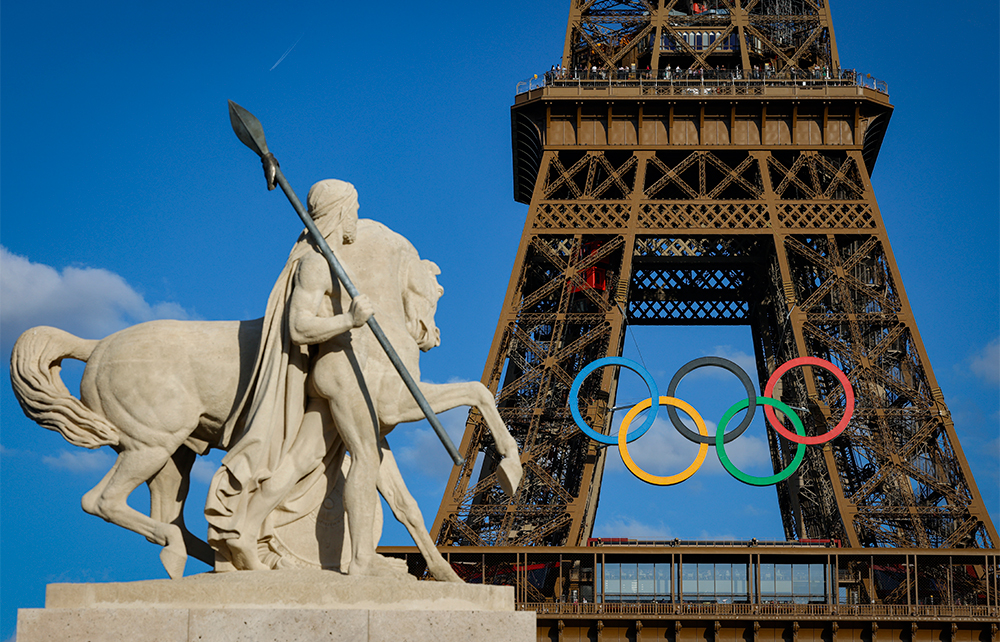The French television personality Laurent Baffie, interviewed by Le Figaro, came up with a nice phrase for the success beyond most expectations of the Paris Olympics: it had been ‘une parenthèse enchantée’, he said, but parentheses always have to close and ‘la merde va revenir’. I’m guessing he meant France’s brief political truce will end and attention will refocus on economic woes, even after a slight fall in unemployment – to 7.3 per cent, compared with the UK rate of 4.4 per cent – that was announced as another ‘bonne surprise’.
Writing from the Dordogne, where lunch is long and markets that matter are not global and financial but local and focused on tomatoes and melons, I hope you’ll forgive me if I take Baffie’s cue and offer a sunny interlude. La merde will hit the fan for sure in the autumn: in riot-scarred Britain, Trump-torn America and all across Europe as far as the Ukrainian front. But just for this week, I’m inclining to the brighter side.
Microcredit hero
One cause for optimism is the emergence of Muhammad Yunus as interim leader of Bangladesh after the ousting of the autocratic Sheikh Hasina. Yunus is a rare phenomenon: a Nobel laureate economist whose practical ideas have helped lift many thousands of people out of poverty. Another, though more controversial, is Hernando de Soto (once a presidential candidate in his own home country, Peru) who advocates awarding to squatters and street traders property rights that can be used to secure loans. Both men realised that access to credit – nowadays often seen as dangerous in the developed world – is essential for the most basic level of subsistence business-building.
Yunus’s epiphany was an encounter in 1976 with village women who were making bamboo furniture but had to borrow at exorbitant rates to buy raw materials. He lent them small sums of his own money on terms that allowed them to make a profit. They repaid him and he went on to institutionalise this system of ‘microcredit’ through the much-imitated Grameen Bank, which has since lent $38 billion to otherwise marginalised Bangladeshi borrowers, currently reaching 10.6 million of them. Hasina’s regime tried but failed to blacken Yunus’s reputation and now – at 84, three years older than Joe Biden – he’s been asked to grasp the reins of his turbulent nation. Let’s hope dark forces don’t rise against him.
Too cosy?
Here’s another good-news item – at least that’s how it was reported – emanating from the subcontinent: the arrival of the Indian telecoms titan Sunil Mittal as BT’s biggest shareholder, having bought the 24.5 per cent stake previously held by the French-Israeli dealmaker Patrick Drahi, who has problems elsewhere. An Anglophile with an honorary knighthood who also owns the Gleneagles hotel in Perthshire, Mittal has ruled out a takeover of BT and praised the chief executive Allison Kirkby for a ‘wonderful job’ rolling out full-fibre broadband to reach 25 million premises by 2026. All very cosy – but thousands of BT users waiting for stronger internet connections might dis-agree; and let’s not forget BT’s second biggest shareholder, Deutsche Telekom, whose boss said plainly last year ‘I want my money back’ after almost a decade of weakness in BT’s share price. A more threatening major shareholder might fire up BT’s performance on all fronts.
Summer ripple
But what about the pound? The financial market I can’t ignore, especially as a holidaymaker abroad, is the one in which sterling has posted its ‘longest run of losses in almost a year’ (Guardian) in reaction to street violence that made the UK a no-go destination for foreign tourists, the end of the short Starmer honeymoon and the first of what’s expected to be a series of interest-rate cuts. Is the thin hope of economic revival the Tories left behind about to be knocked out by a flight of foreign investors?
Nah, says my man on the foreign ex-change desk, who in quiet August trading has his feet up watching YouTube replays of the women’s beach volleyball final. In fact the pound has stayed in a range of $1.26-28 and €1.16-17, where it still is, for most of the year, with one brief April surge and dip fuelled by mismatched US and UK rate-cut signals. A fall of a little over 2 per cent from the high of the past month, also driven as much by US news as by events at home, is neither here nor there in terms of historic sterling volatility.
Remember when the pound in your pocket plunged close to dollar parity immediately after Kwasi Kwarteng’s mini-Budget in September 2022? That’s what a proper sterling crisis looks like. This, like the recent stock-market correction, is a summer ripple.
Sex, drugs and ripe tomatoes
Speaking of foreign exchange desks, something to look forward to in the autumn BBC schedules – or watch tonight if you have a teenager who can hack into the US HBO network, where it has just launched – is a third series of Industry, the drama that follows the dealings of young thrusters on and off the London trading floor of the fictional US investment bank Pierpoint & Co. Written by Mickey Down (ex-Rothschilds) and Konrad Kay (ex-Morgan Stanley), the show achieves a heightened authenticity worthy of Dickens in its financial detail, plus lashings of sex and drugs.
If your recently graduated offspring are contemplating careers in the money world, they may be fascinated or repelled by Industry, but they should certainly study past episodes to prepare for the job interview. Meanwhile, I don’t think it’s a spoiler to reveal that a suitably dramatised cover of The Spectator has a walk-on part in the new series.
And finally, back to the market that never disappoints – at Cazals in the Lot – to buy multicoloured ripe tomatoes for a delicious gazpacho. Another long lunch beckons.








Comments